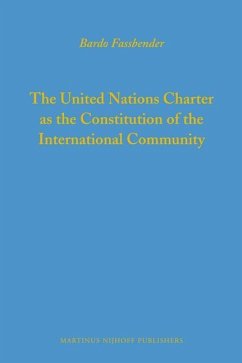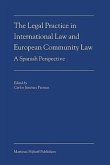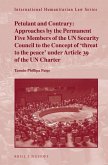The a oeconstitutionalizationa of international law is one of the most intensely debated issues in contemporary international legal doctrine. The term is used to describe a number of features which distinguish the present international legal order from a oeclassicala international law, in particular its shift from bilateralism to community interest, and from an inter-state system to a global legal order committed to the well-being of the individual person. The author of this book belongs to the leading participants of the constitutionalization debate. He argues that there indeed exists a constitutional law of the international community that is built on and around the Charter of the United Nations. In this book, he explains why the Charter has a constitutional quality and what legal consequences arise from that characterization.
Hinweis: Dieser Artikel kann nur an eine deutsche Lieferadresse ausgeliefert werden.
Hinweis: Dieser Artikel kann nur an eine deutsche Lieferadresse ausgeliefert werden.








